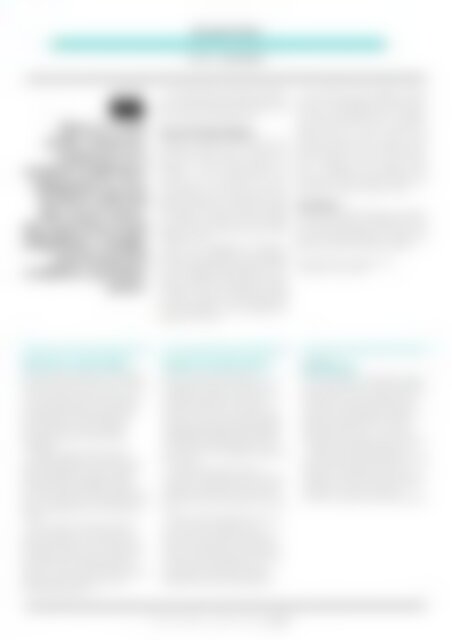Credit Management November 2023
THE CICM MAGAZINE FOR CONSUMER AND COMMERCIAL CREDIT PROFESSIONALS
THE CICM MAGAZINE FOR CONSUMER AND COMMERCIAL CREDIT PROFESSIONALS
You also want an ePaper? Increase the reach of your titles
YUMPU automatically turns print PDFs into web optimized ePapers that Google loves.
HR MATTERS<br />
AUTHOR – Gareth Edwards<br />
Stress is a fact<br />
of life. However,<br />
employers in a<br />
modern world have<br />
obligations to care<br />
for their staff and<br />
this covers stress.<br />
But apart from legal<br />
obligations, a happy<br />
and unstressed<br />
workforce performs<br />
better.<br />
The case provides a warning to employers<br />
to not simply talk about measures, but to<br />
make sure that that they are agreed with<br />
the employee and implemented.<br />
Issues with self-medication<br />
A natural coping mechanism for an<br />
individual under stress is to self-medicate<br />
with drink and/or drugs. However, an<br />
employer in this situation will need to<br />
consider its wider responsibilities for<br />
the safety of its workforce as a whole<br />
and the public. If for no other reason, an<br />
employee should not be permitted to work<br />
under the influence of alcohol or drugs.<br />
The employer, if they knowingly allowed<br />
it, could be considered to be vicariously<br />
liable in the event of the employee causing<br />
damage or injury.<br />
The use or possession of drugs or<br />
alcohol in the workplace by an employee<br />
may be a disciplinary matter that will need<br />
to be investigated and considered in line<br />
with the employer's disciplinary process.<br />
However, if the use of alcohol and or drugs<br />
is related to stress the employer should<br />
consider, alongside its other obligations,<br />
its responsibilities to that employee and<br />
support as necessary.<br />
As a first step the employer should<br />
speak with the employee discreetly. It may<br />
be that it is appropriate for the employer<br />
to contact the employee's GP or another<br />
health professional. Further, employers<br />
should have in place policies and<br />
procedures setting out the rules around<br />
alcohol and drugs in the workplace. This<br />
should explain, amongst other things,<br />
that if employees are concerned that<br />
they are developing a dependency, they<br />
must inform their employer in order that<br />
appropriate support can be provided.<br />
In summary<br />
Stress is a fact of life. However, employers<br />
in a modern world have obligations to care<br />
for their staff and this covers stress. But<br />
apart from legal obligations, a happy and<br />
unstressed workforce performs better.<br />
Gareth Edwards is a partner in the<br />
employment team at VWV.<br />
PRACTICAL SELF-HELP<br />
Stress build up is often associated with<br />
increased muscular tension. So, frequent<br />
headaches and muscular tension in the<br />
neck, shoulders, back and stomach are<br />
commonly experienced. Occasionally<br />
we may feel the heart beating rapidly.<br />
Clenched hands, profuse sweating,<br />
general restlessness with agitation,<br />
and snappiness are the other main<br />
symptoms.<br />
Illnesses linked with stress build<br />
up are well recognised. These include<br />
anxiety, depression, eczema, psoriasis,<br />
tension headaches, migraine attacks,<br />
stomach ulcers and phobias. There is<br />
also a link between stress and high blood<br />
pressure, which is one of the factors that<br />
may eventually lead to a heart attack or<br />
stroke.<br />
Stress can lead to mental confusion<br />
with an inability to think clearly and<br />
effectively. Memory can fail and simple<br />
things get forgotten, trivial work chores<br />
often take on a far greater significance<br />
than they deserve, and things can get<br />
blown out of all proportion. Some cannot<br />
delegate tasks and others try to do<br />
everything themselves.<br />
DAILY PLAN OF ACTION<br />
Other forms of self-help revolve<br />
around trying to plan the day and time<br />
management. Where possible, even<br />
though it’s hard when on the road, take<br />
a short break from work and take a<br />
brisk walk. Learn how to become more<br />
assertive to deal with people who make<br />
unreasonable demands. Spreading the<br />
workload and delegating jobs can help<br />
too. But also look at diet and include a<br />
wide range of fruit, vegetables, pasta and<br />
brown rice.<br />
It’s important to allow time for<br />
relaxation. If smoking, alcohol, and lack<br />
of sleep are a key feature of life, seek to<br />
address this. They may relieve stress in<br />
the short-term but won’t help in the long<br />
run.<br />
Some of the harmful effects of stress<br />
can be reduced through exercise.<br />
Exercise is an opportunity to get rid of<br />
pent-up energy and also experience a<br />
change of environment. The relaxation<br />
that occurs following physical exercise<br />
can aid sleep. Exercise that is age<br />
appropriate and matches the general<br />
level of fitness are more likely to be<br />
sustained.<br />
SOLUTIONS<br />
There is no magic cure for stress. Some<br />
turn to their doctor or even self-medicate<br />
with alcohol or worse. What were once<br />
considered to be safe medications are<br />
now known to produce psychological<br />
dependence and addiction and doctors<br />
don’t prescribe freely. To an extent,<br />
individuals should try to learn how to<br />
recognise and manage stress and anxiety.<br />
There are many well established<br />
techniques for recognising and managing<br />
stress. The best known is yoga, but<br />
meditation, self-hypnosis, and muscular<br />
relaxation exercises, and music therapy<br />
can help too. The web, including<br />
YouTube, can help with these techniques.<br />
Brave | Curious | Resilient / www.cicm.com / <strong>November</strong> / PAGE 32

















